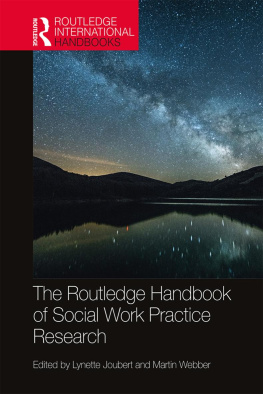FOR INFORMATION:
SAGE Publications, Inc.
2455 Teller Road
Thousand Oaks, California 91320
E-mail: order@sagepub.com
SAGE Publications Ltd.
1 Olivers Yard
55 City Road
London EC1Y 1SP
United Kingdom
SAGE Publications India Pvt. Ltd.
B 1/I 1 Mohan Cooperative Industrial Area
Mathura Road, New Delhi 110 044
India
SAGE Publications Asia-Pacific Pte. Ltd.
3 Church Street
#10-04 Samsung Hub
Singapore 049483
Copyright 2017 by Sage Publications, Inc.
All rights reserved. No part of this book may be reproduced or utilized in any form or by any means, electronic or mechanical, including photocopying, recording, or by any information storage and retrieval system, without permission in writing from the publisher.
Printed in the United States of America
Library of Congress Cataloging-in-Publication Data
Names: DePoy, Elizabeth, author. | Gilson, Stephen French, author.
Title: Social work research and evaluation : examined practice for action / Elizabeth G. DePoy, University of Maine, Stephen F. Gilson, University of Maine.
Description: Thousand Oaks, California : SAGE, [2017] | Includes bibliographical references and index.
Identifiers: LCCN 2016000037 | ISBN 9781452259642 (pbk. : alk. paper)
Subjects: LCSH: Social serviceEvaluation. | Social serviceResearch. | Social serviceMethodology. | Evaluation research (Social action programs)
Classification: LCC HV40 .D4563 2017 | DDC 361.0072dc23 LC record available at http://lccn.loc.gov/2016000037
This book is printed on acid-free paper.
Acquisitions Editor: Nathan Davidson
Editorial Assistant: Heidi Dreiling
Production Editor: Bennie Clark Allen
Copy Editor: Michelle Ponce
Typesetter: C&M Digitals (P) Ltd.
Proofreader: Annie Lubinsky
Indexer: Robie Grant
Cover Designer: Candice Harman
Marketing Manager: Shari Countryman
Foreword
In 2005, I was invited to make a contribution to The Encyclopedia of Social Measurement. The centerpiece of my assignment was to address measurement issues within social work practice and research. I began my work with an historical approach, reading relevant social work meeting minutes from the years 1903 to 1905. In between the lines, I noticed what seemed to be disagreement between social work practitioners and professors regarding the definition of knowledge. In the 1929 edition of Social Work Year Book (the precursor of The Encyclopedia of Social Work) the difference was no longer hidden.
The disjuncture between research and practice still exists. Practitioners often find research to be dense and irrelevant to the complexity of human experience that is witnessed in the field. For example, practitioners find that research models taught in both undergraduate and graduate school are not feasible to implement in the real world of social work practice. For well over a decade, despite their time consuming conduct in many practice settings, single-system designs have been held in high esteem within the classroom. But, unlike the 1920s, the debate between practitioners and research faculty has become sub-rosa and remains problematic in a context of evidence-based accountable practice.
DePoy and Gilsons Social Work Research and Evaluation: Examined Practice for Action serves as a desperately needed bridge between social work research and social work practice. The authors offer the most creative presentation I have read within the last 40 years. The examples within the text become a great catalyst to integrate research, evaluation, and practice. As an unintended consequence of their work, DePoy and Gilson have spearheaded an effort to reduce the tension between social work practitioners and researchers. In the end, their work will improve social work practice and education and create greater harmony between the academic and the practice worlds.
The question becomes: How were DePoy and Gilson able to accomplish this Herculean task? They have written a social work practice guide that focuses on the essentials of systematic thinking and action and have seamlessly woven it into a model for social work knowing and doing. Their model builds on, integrates, and advances beyond the work of many successful authors of past research and evaluation texts. Social Work Research and Evaluation: Examined Practice for Action anchors conceptual and praxis components on current thinking in which knowing and doing coexist in a network of practice set in a context of globalism and technology. They creatively marry disciplines that on the surface seem to be unrelated. They link the unlinkable! More than any other authors, DePoy and Gilson stress social work values but they understand that in the tradition of educating researchers, social values are to be bracketed. Consistent with the view that social values are a part of social work research, Examined Practice urges social workers in all settings to be part of the knowledge development enterprise, one that is necessary for the credibility and growth of our profession.
Stephen M. Marson, PhD; Retired
Professor of Sociology at University of North Carolina Pembroke;
Current Adjunct Faculty, Wake Forest University
Wake Forest College, Department of Sociology
Preface
A number of factors prompted us to write this book. First, as we proceed through the second decade of the 21st century, professional accountability has become increasingly central to social work. Governments in the United States and abroad, insurance companies, and agencies have vigorously emphasized and even developed empirical models, logic modeling, and evidence-based practice. The question How do you know? echoes throughout actual and virtual professional social work spaces from diverse audiences, consumers, clients, and customers who previously accepted claims, services, and products on professional authority alone.
Second is the intellectual trend toward pluralism. What we mean by pluralism is the acceptance of multiple ways of knowing. Thus, while evidence is requested for social work decisions, actions, and entities, the nature of the evidence is varied. Numbers are compelling but so are narratives, images, objects, and even maps of actual and abstract geographies.








